

Neuroanatomie : système nerveux central et système nerveux périphérique. Effectiveness of biological treatments with mental illnesses. 19 Oct How effective are biological treatments for mental illnesses?
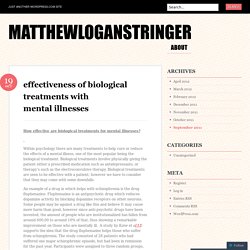
Within psychology there are many treatments to help cure or reduce the effects of a mental illness, one of the most popular being the biological treatment. Biological treatments involve physically giving the patient either a prescribed medication such as antidepressants, or therapy’s such as the electroconvulsive therapy. The roots of mental illness. Diagnosing mental illness isn't like diagnosing other chronic diseases.
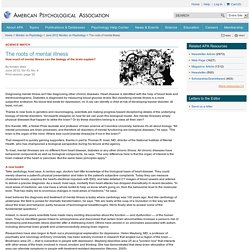
Heart disease is identified with the help of blood tests and electrocardiograms. Diabetes is diagnosed by measuring blood glucose levels. Biological treatments of mental illness and abnormality. Biological treatments of mental illness and abnormalityBiological treatments act directly on the biological mechanisms that cause, or are involved in, mental illness.
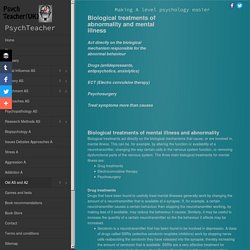
This can be, for example, by altering the function or availability of a neurotransmitter, changing the way certain cells in the nervous system function, or removing dysfunctional parts of the nervous system. The three main biological treatments for mental illness are:Drug treatmentsElectroconvulsive therapyPsychosurgeryDrug treatmentsDrugs that have been found to usefully treat mental illnesses generally work by changing the amount of a neurotransmitter that is available at a synapse.
If, for example, a certain neurotransmitter causes a certain behaviour then stopping the neurotransmitter working, by making less of it available, may reduce the behaviour it causes. Electroconvulsive Therapy. Lobotomy - PBS documentary, on Walter Freeman.mp4. Drug Therapy vs. Natural Therapy. "This Is Psychology" Episode 9: Drugs and therapy. CBT for Depression. Managing depression with 10 Minute CBT. Cognitive Behaviour Therapy. Beating Phobias and Anxiety - Graded Exposure/ Systematic Desensitization.
Psychoanalysis / Modern Psychoanalysis. Eliza, Computer Therapist. Let's talk about your feelings.

The original ELIZA first appeared in the 60's. She seems almost human. This example of artificial intelligence works best, however, if you limit your conversation to talking about yourself and your feelings. Full sentences will give better results. To copy the dialog, you can download Screenpresso or use an app for Google Crome, IE or Foxpro called FireShot Screen Capture. Health & Wellness Centre. On Becoming a Person - Carl Rogers. What Is Psychoanalysis? Freud - Psychoanalysis. Psychopath vs Sociopath. Psychopathy and sociopathy are anti-social personality disorders.
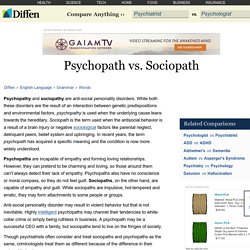
While both these disorders are the result of an interaction between genetic predispositions and environmental factors, psychopathy is used when the underlying cause leans towards the hereditary. Sociopath is the term used when the antisocial behavior is a result of a brain injury or negative sociological factors like parental neglect, delinquent peers, belief system and upbringing. Multiple Personality Disorder - Documentary. Mad, bad or sad? The Psychology of Personality Disorders - Professor Glenn D Wilson. TEDxMarrakesh - Jon Ronson - How to Spot a Psychopath. '100% accurate' eye test for schizophrenia claim. Thursday November 1 2012 The link between schizophrenia and abnormal eye movements is well established “New ‘100% accurate’ test diagnoses schizophrenics simply by checking their gaze,” the Daily Mail reports.
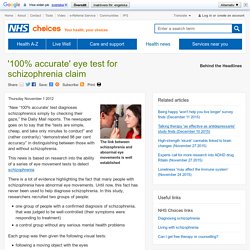
The newspaper goes on to say that the “tests are simple, cheap, and take only minutes to conduct” and (rather contrarily) “demonstrated 98 per cent accuracy” in distinguishing between those with and without schizophrenia. Four Patients with Schizophrenia. Schizophrenia ABC 20-20 Documentary Part 1. Margaret Trudeau Interview. Stanford's Sapolsky On Depression in U.S. (Full Lecture) Depression during pregnancy. Is it common to suffer from depression or anxiety during pregnancy?
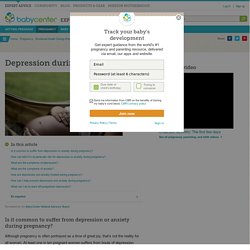
Although pregnancy is often portrayed as a time of great joy, that's not the reality for all women. At least one in ten pregnant women suffers from bouts of depression. For years, experts mistakenly believed that pregnancy hormones protected against depression, leaving women more vulnerable to the illness only after the baby was born and their hormone levels plunged. Anxiety Disorders: Types, Causes, Symptoms, Diagnosis, Treatment, and Prevention. What Are Anxiety Disorders?
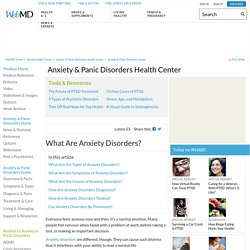
Everyone feels anxious now and then. It’s a normal emotion. Many people feel nervous when faced with a problem at work, before taking a test, or making an important decision. Anxiety disorders are different, though. They can cause such distress that it interferes with your ability to lead a normal life. This type of disorder is a serious mental illness. Slideshow Common Phobias start What Are the Types of Anxiety Disorders? There are several kinds, including: Panic disorder. Social anxiety disorder. Helpguide.org. Multiple Personality Disorder - Documentary. The World's Weirdest Phobias (Mental Health Guru)
Dealing with Anxiety and Panic Attacks. Labeling You a Mental Health Patient. Diagnostic and Statistical Manual of Mental Disorders, Fourth Edition (DSM-IV) Psychiatric Diagnoses are categorized by the Diagnostic and Statistical Manual of Mental Disorders, 4th.
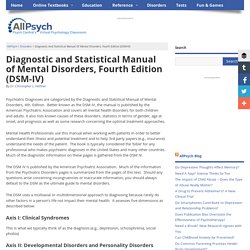
Edition. Better known as the DSM-IV, the manual is published by the American Psychiatric Association and covers all mental health disorders for both children and adults. It also lists known causes of these disorders, statistics in terms of gender, age at onset, and prognosis as well as some research concerning the optimal treatment approaches. Mental Health Professionals use this manual when working with patients in order to better understand their illness and potential treatment and to help 3rd party payers (e.g., insurance) understand the needs of the patient. The book is typically considered the ‘bible’ for any professional who makes psychiatric diagnoses in the United States and many other countries.
The DSM IV is published by the American Psychiatric Association.